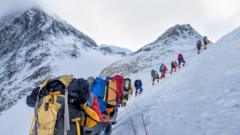Nepal is set to impose a notable increase in permit fees for climbers aiming to reach the summit of Mount Everest, as part of a broader effort to manage the increasing demands on the iconic peak. Beginning in September, the cost to obtain a climbing permit will rise from the longstanding fee of $11,000 to $15,000, reflecting a 36% hike. Climbing outside the prime season will also see a similar price adjustment, with permits costing $7,500 from September to November and $3,750 from December to February.
The climbing sector contributes significantly to Nepal's economy, as more than 4% of its revenue is generated from this activity. However, concerns have been growing regarding the number of permits issued yearly, with roughly 300 granted annually. Critics argue that an excessive number of climbers not only endangers safety but also strains the delicate ecosystem of the mountain.
Narayan Prasad Regmi, the director general of the Department of Tourism, explained the fee increase by noting that the royalty had not been reviewed for an extended period, emphasizing the need for an update in light of current realities. While the hike is intended to boost revenue, Regmi did not clarify how the additional funds would be allocated.
The government is also under pressure following an April 2024 ruling by Nepal's Supreme Court, which mandated a review and limitation on the number of mountaineering permits issued for Everest. However, no specific maximum has been established, leaving room for potential increases despite the court's directive.
Heightened awareness of the environmental impact of overcrowding has prompted efforts to preserve the mountain's integrity. In 2019, the Nepalese army initiated annual clean-up campaigns, removing large volumes of waste and even human remains, underscoring the mountain's reputation as a severe "garbage dump."
Nepal is home to eight of the world’s highest peaks, including Mt. Everest, where the tension between tourism, preservation, and mountaineering continues to evolve amid ongoing scrutiny from both the public and environmentalists.





















